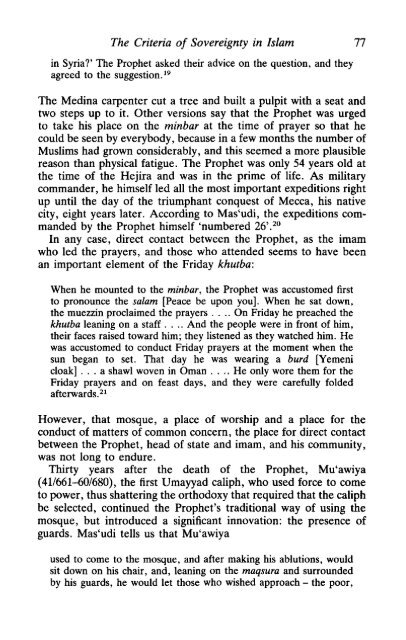Fatima.Mernessi_The-Forgotten-Queens-of-Islam-EN
Fatima.Mernessi_The-Forgotten-Queens-of-Islam-EN
Fatima.Mernessi_The-Forgotten-Queens-of-Islam-EN
Create successful ePaper yourself
Turn your PDF publications into a flip-book with our unique Google optimized e-Paper software.
<strong>The</strong> Criteria <strong>of</strong> Sovereignty in <strong>Islam</strong> 77<br />
in Syria?' <strong>The</strong> Prophet asked their advice on the question, and they<br />
agreed to the suggestion. 19<br />
<strong>The</strong> Medina carpenter cut a tree and built a pulpit with a seat and<br />
two steps up to it. Other versions say that the Prophet was urged<br />
to take his place on the minbar at the time <strong>of</strong> prayer so that he<br />
could be seen by everybody, because in a few months the number <strong>of</strong><br />
Muslims had grown considerably, and this seemed a more plausible<br />
reason than physical fatigue. <strong>The</strong> Prophet was only 54 years old at<br />
the time <strong>of</strong> the Hejira and was in the prime <strong>of</strong> life. As military<br />
commander, he himself led all the most important expeditions right<br />
up until the day <strong>of</strong> the triumphant conquest <strong>of</strong> Mecca, his native<br />
city, eight years later. According to Mas'udi, the expeditions commanded<br />
by the Prophet himself 'numbered 26'. 20<br />
In any case, direct contact between the Prophet, as the imam<br />
who led the prayers, and those who attended seems to have been<br />
an important element <strong>of</strong> the Friday khutba:<br />
When he mounted to the minbar, the Prophet was accustomed first<br />
to pronounce the salam [Peace be upon you]. When he sat down,<br />
the muezzin proclaimed the prayers .... On Friday he preached the<br />
khutba leaning on a staff .... And the people were in front <strong>of</strong> him,<br />
their faces raised toward him; they listened as they watched him. He<br />
was accustomed to conduct Friday prayers at the moment when the<br />
sun began to set. That day he was wearing a burd [Yemeni<br />
cloak] ... a shawl woven in Oman .... He only wore them for the<br />
Friday prayers and on feast days, and they were carefully folded<br />
afterwards. 21<br />
However, that mosque, a place <strong>of</strong> worship and a place for the<br />
conduct <strong>of</strong> matters <strong>of</strong> common concern, the place for direct contact<br />
between the Prophet, head <strong>of</strong> state and imam, and his community,<br />
was not long to endure.<br />
Thirty years after the death <strong>of</strong> the Prophet, Mu'awiya<br />
(41/661-60/680), the first Umayyad caliph, who used force to come<br />
to power, thus shattering the orthodoxy that required that the caliph<br />
be selected, continued the Prophet's traditional way <strong>of</strong> using the<br />
mosque, but introduced a significant innovation: the presence <strong>of</strong><br />
guards. Mas'udi tells us that Mu'awiya<br />
used to come to the mosque, and after making his ablutions, would<br />
sit down on his chair, and, leaning on the maqsura and surrounded<br />
by his guards, he would let those who wished approach - the poor,


